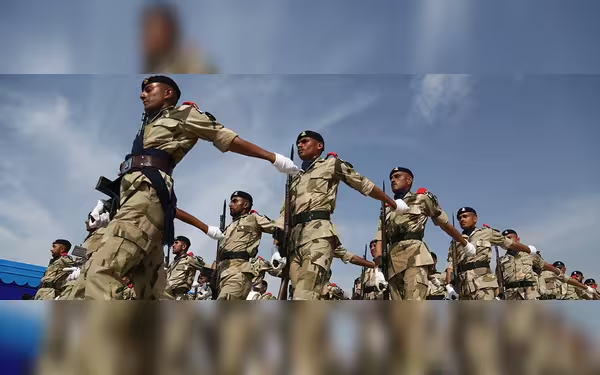Thursday, July 4, 2024 06:32 PM
Pakistan's Counterterrorism Efforts Amid Rising Threats
- TTP's surge in terrorist activities poses a grave threat to Pakistan's security.
- Pakistan initiates 'Azam-e-Istehkam' military operation to combat terrorism.
- Balancing diplomatic dialogue and firmness crucial in dissuading Afghan Taliban's support for TTP.
 Image Credits: RUSI
Image Credits: RUSIPakistan faces escalating terrorism threats as TTP's activities surge, prompting the initiation of 'Azam-e-Istehkam' military operation. Balancing diplomacy and firmness is crucial to dissuade Afghan Taliban's support for TTP and safeguard regional stability.
Pakistan has been grappling with a surge in terrorism, particularly following the Afghan Taliban's rise to power in Kabul. Despite hopes for improved security with a friendly government in Afghanistan, Pakistan has witnessed a spike in terrorist activities, primarily orchestrated by Tehrik-e Taliban Pakistan (TTP) with backing from Afghanistan.
The strong ties between TTP and Afghan Taliban, united by shared religious beliefs and ethnicity, have exacerbated the terrorism crisis in Pakistan. Once supported by the Afghan Taliban, TTP is now wreaking havoc in the country, with a specific focus on targeting security forces.
The strained relations between Pakistan and Afghanistan, stemming from TTP's actions, have led to escalating tensions. Pakistan has called on the Afghan Taliban to rein in TTP's activities, but Kabul's response has been lukewarm, prompting Islamabad to contemplate more assertive measures.
In response to the escalating threat, Pakistan has initiated a new intelligence-driven military operation, 'Azam-e-Istehkam (June 2024),' to combat terrorism and extremism. While the government and military are in sync regarding this operation, opposition parties have expressed reservations, underscoring the importance of broader political consensus.
Pakistan's Defense Minister has hinted at the possibility of cross-border military operations in Afghanistan to root out terrorists. However, such actions could violate Afghan sovereignty and trigger regional instability.
To effectively tackle terrorism, Pakistan must pursue non-military avenues outlined in the National Action Plan, including fostering political stability, promoting economic development, upholding the rule of law, and promoting de-radicalized education. Additionally, countering the ideologies of TTP and BLA and engaging with the Afghan Taliban through diplomatic channels are critical steps.
By striking a balance between diplomatic dialogue and firmness, Pakistan aims to dissuade the Afghan Taliban from supporting TTP. Utilizing Afghan refugees and implementing economic measures could exert pressure on the Afghan Taliban to sever ties with TTP without compromising Pakistan's strategic interests.
Pakistan must address the underlying causes of terrorism through a holistic approach that integrates military operations with socio-economic development and diplomatic initiatives to safeguard regional stability and security.













